What is SaleHoo?
SaleHoo is an online directory and research tool that can connect retailers, internet vendors, and dropshippers with reliable suppliers. The vast database of manufacturers, dropshippers, and wholesalers helps merchants find reliable sources of goods to resell on platforms like Shopify, eBay, and Amazon.
It saves entrepreneurs the headache of having to look up their suppliers personally. Most novice sellers are worried by the repeated troubles, such as scams or less trustworthy dealers, so it checks suppliers for quality. SaleHoo’s friendly approach on product searching has gained popularity among the eCommerce business people and owners of small companies.
Overview of SaleHoo’s Products
1. SaleHoo’s Supplier Directory
Offers businesses access to more than 8,000 verified suppliers of manufacturers, dropshippers, and wholesalers in many product categories.
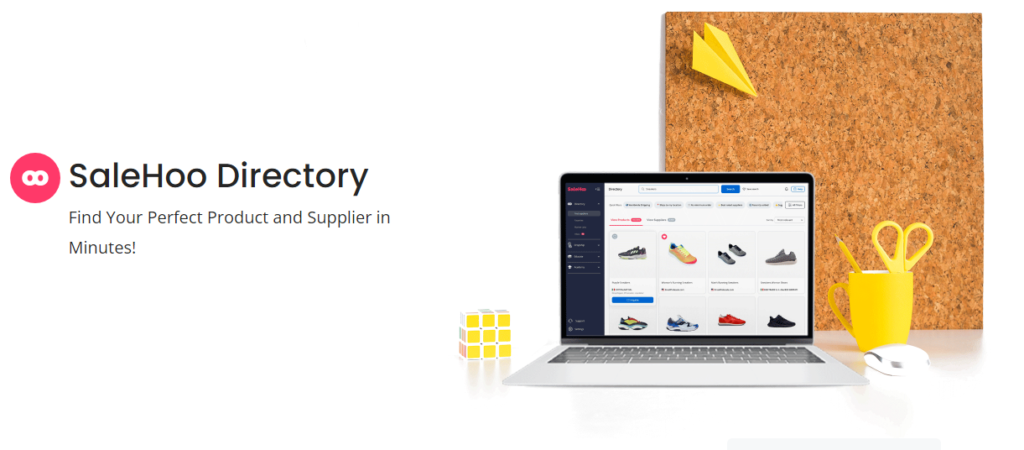
Product Categories: Electronics Home Furnishings & Décor Beauty & Personal Care Clothes & Apparel And More
Features:
- Verified suppliers, ensuring quality and reliability.
- Providers that support the back dropshipping and wholesale business models.
- Good for traders and e-commerce vendors.
How SaleHoo Directory works?
2. SaleHoo Dropship
SaleHoo’s selected list of dropshipping suppliers helps retailers sell their products without having to hold stock in advance.
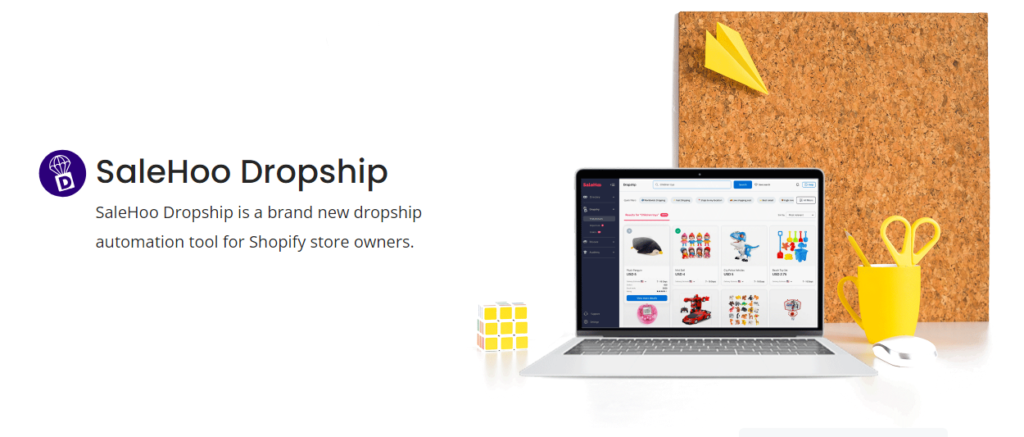
Features:
- With a product category or niche, search to find the supplier best suited for you.
- Save yourself the hassle of fulfillment and storage by shipping directly to the customer.
- Reliability in both service and product quality comes with the choice of vendors.
- This is ideal for your online store, with usage on eBay, WooCommerce, and Shopify.
Product Categories: Electronics Home Décor Beauty & Personal Care Fashion & Apparel & More
3. SaleHoo Market Insights
The SaleHoo Market Research Lab is going to guide a seller in making the right decisions with more data-driven insights on product trends, price, and competition.
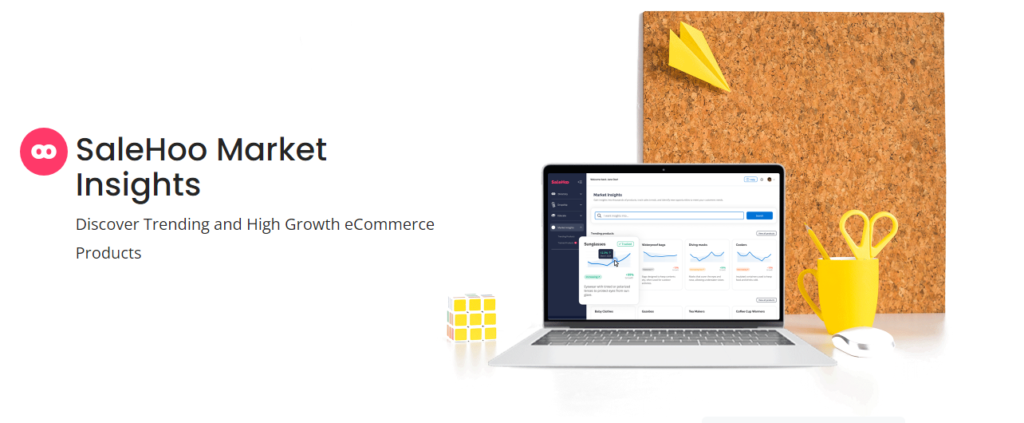
Key Features:
- Finding profitable products that have less competition with high demand.
- Detecting competition prices and keeping prices competitive in the market.
- Information that helps in the sourcing of products and special selection.
- Suitable for online sellers who want to sell their products on Shopify, eBay, or other e-commerce websites.
Applications: It focuses on the most popular and less competitive products; the technology used to allow the merchant to extract the most profit out of the optimal selection of product.
4. eCommerce Accelerator
eCommerce Accelerator by SaleHoo is indeed the all-in-one ideal solution for creating a steadily profitable eCommerce business. Except for eight high-value bonuses, this product has everything you need to succeed, including training from dropship to wholesale, our market research tool, dropship tool, and directory tool.
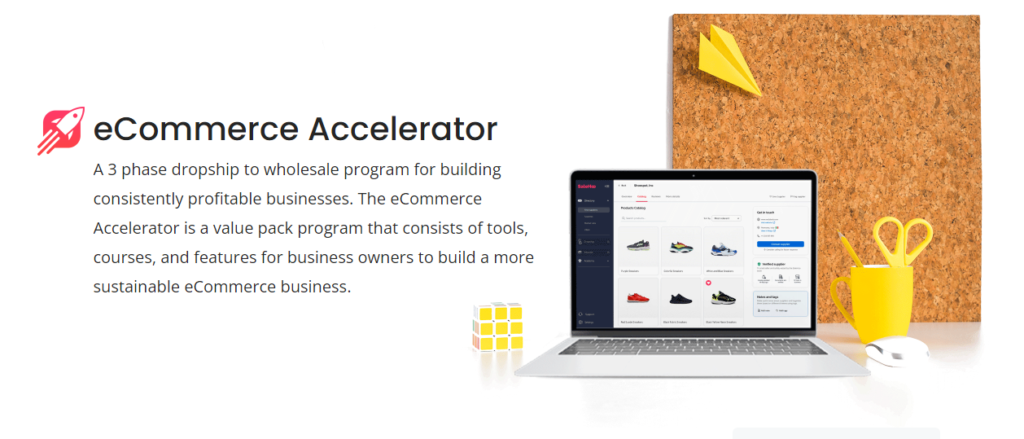
How eCommerce Accelerator Works?
How to Effectively Promote the eCommerce Accelerator?
5. SaleHoo Educate
SaleHoo has an abundant set of guide materials, spanning eBooks and webinars up to tutorials on the subjects of dropshipping, retailing strategies, and eCommerce.

Features:
- eBooks and webinars: Pre-layout contents include finding products to source, setting up an online business, and getting the momentum of presence within eCommerce businesses.
- Tutorials: Understand how to best sell wholesale and in dropshipping
- Discussion Board: Interact with other wholesalers or sellers and share knowledge, ideas, and even personal accounts.
- Stay updated on market trends and actional strategies.
Benefits: A perfect course for new and experienced sellers in terms of enhancing their network and skill sets.
How to Use SaleHoo for Dropshipping Success?
The platform has streamlined the process of adding products to your store and finding reliable suppliers to make success easier for you if your plan is to start a profitable business. Here’s more detailed information on how you can use SaleHoo to grow your dropshipping business.
Step 1: Creating Your Account at SaleHoo
How to Get Started with SaleHoo:
- Go to the SaleHoo website and pick one of the membership types, which can either be on a yearly or lifetime access basis.
- After you sign up, then it unlocks a supplier directory, research tools, and community resources at SalesHoo.
Business Objectives and Niche:
- First, identify your niche—one particular market segment. Examples: a pet product, gadgets, or even fitness gear
- Having a niche would make it much easier to identify suppliers and locate those customers.
Explore the Dashboard and Research Lab:
Once you activate your account, you have to explore the dashboard in order to understand how the directory and research tools work. Explore the Market Research Lab in order to find out what the currently trending products in your niche are.
Step 2: Finding the Best Suppliers
Supplier List:
- You can search for suppliers based on category, niche, or product type, such as clothing, electronics, and beauty, from SaleHoo.
- Check off the requirement for a supplier to ship directly to your customers.
Assess Supplier Info:
- Each supplier has a profile that carries information such as minimum order quantity, shipping time, and location.
- You will require a supplier with excellent reviews, affordable prices, and short shipping times in case of good customer support.
Contact Suppliers:
- Inquire them via the messaging system of SaleHoo or directly on the supplier’s website before finalizing a supplier, ask if they have the product and their shipping terms and return policies.
- Demand samples of the products whenever possible to ensure that the products are of quality before placing them in your store.
Look for supplier replacements:
- Most suppliers can promise a replacement for defective goods or offer white-labeling where you can sell the products under your brand.
Step 3: Adding Products to Your Store
Configuring Your eCommerce Site:
- Choose a platform, be it Shopify, WooCommerce, or eBay, in which you can list and sell your products.
- Choose a theme for your store that reflects your niche.
- Product importation from suppliers
- Download all product descriptions, pictures, and details directly from your supplier or by using SaleHoo’s tools.
- Using new ERP systems with apps available may connect and sync your shop directly with suppliers.
Optimize Product Listings:
- Compose an SEO-friendly description of the product to accompany key features and benefits.
- This will feature high-quality images and, if available, customers who have left reviews to help build trust.
Set competitive prices:
- Utilize the SaleHoo Market Research Lab to reference the average selling prices for analogous products.
- Pricing must cover every expense; fees for suppliers, shipping, and online marketplace commissions, as well as be competitive.
SaleHoo Dropshipping vs. Wholesale: Which Is Right for You?
A choice between choosing to operate an eCommerce business from a dropshipping or wholesale model can really affect the possible operations of an eCommerce enterprise. There are many advantages in both models; SaleHoo endorses both options, allowing sellers to easily make a suitable choice. This guide aims to highlight some of the most important differences between each method with their advantages and downsides and in what ways SaleHoo caters to both.
Differences Between Dropshipping and Wholesale
| Feature | Dropshipping | Wholesale |
|---|---|---|
| Inventory | No inventory required (supplier ships to customers) | Seller holds stock and manages inventory |
| Upfront Costs | Low or minimal | Higher upfront cost for bulk purchases |
| Shipping | Managed by the supplier | Seller responsible for packing and shipping |
| Profit Margins | Lower margins due to supplier handling logistics | Higher margins from buying in bulk |
| Order Fulfillment | Processed per order | Orders fulfilled from existing stock |
| Risk | Lower (no stock to manage) | Higher (unsold inventory can become a liability) |
| Control | Limited control over branding and delivery speed | Full control over product, branding, and shipping |
Pros and Cons of Each Method
Pros of Dropshipping
- Low Starting Costs: No upfront inventory purchase.
- Flexible Location: You can run the business from anywhere.
- Wide Product Variety: You could try out various products with no heavy investment.
- Low Risk: No unsold stock to concern yourself with.
Cons of Dropshipping
- Less Margins: Pay for the supplier’s logistics services, which lowers your margins.
- Less Control: Possess less control over delivery speed, packaging, and product quality.
- Shipping Problems: As there is more than one supplier in a multi-product order, shipping can also be a pain sometimes.
- Supply Dependency: It relies on suppliers to provide stock and deliver.
Pros of Wholesale
- Greater Margin of Profit: Buying wholesale reduces your cost, thus raising your margins.
- Control of Quality of Products: You can check and pack products.
- Branding Opportunity: You can have custom-made packs or private label items.
Quick Shipment: Your order is shipped quickly because your stock is right there.
Cons of Wholesale
- High Initial Investment: The more inventory you buy at once, the higher your initial investment.
- Storage and handling costs: You will need warehouse space or storage.
- Overstocking Risk: Unsold items may drain your cash.
- Complex Shipping System: You need to take care of shipping and return management.
SaleHoo vs Competitors: How Does It Compare to Other Platforms?
SaleHoo is one of the many networks that will help an online seller find suppliers from whom to source directly through either a wholesale or dropshipping plan. Even though each platform has its own unique features and services, here is a comprehensive comparison of SaleHoo versus some of the popular competitors like Alibaba and Oberlo, followed by its advantages on their own merits.
Comparison: SaleHoo vs. Other Wholesale and Dropshipping Directories
| Feature | SaleHoo | Alibaba | Oberlo |
|---|---|---|---|
| Supplier Type | Wholesalers, manufacturers, dropshippers | Mainly manufacturers and wholesalers | Dropshipping suppliers (AliExpress focus) |
| Directory Size | 8,000+ suppliers | Millions of suppliers | Limited to AliExpress integration |
| Product Range | Wide variety (electronics, fashion, home goods) | Extremely large (almost all categories) | Focused on general consumer goods |
| Vetting Process | Verified, vetted suppliers | Limited vetting (must research independently) | Relied on AliExpress sellers |
| Market Research Tool | Yes (Market Research Lab) | No | No |
| Upfront Costs | Membership fee ($67/year or $127 lifetime) | No fee, but requires bulk orders | Free to use (with Shopify subscription) |
| Shipping Options | Dropshipping and wholesale options | Sellers manage their own shipping | Dropshipping with AliExpress |
| Ease of Use | Easy to navigate and search | Can be overwhelming for beginners | Simple but limited to Shopify users |
| Customer Support | Email, live chat, educational resources | Limited support | Minimal support (no longer active) |
Detailed Comparison of Competitors
SaleHoo vs. Alibaba:
- Supplier Authentication: SaleHoo offers vetted suppliers, and Alibaba depends on the buyer to check the authenticity of the suppliers, therefore having a much higher prospect of scams.
- Shipping and Dropshipping: Alibaba operates primarily on the basis of bulk wholesale orders. On the other hand, it has a very few, almost unattainable, proper dropshipping-friendly suppliers.
- Market Research: SaleHoo features the Market Research Lab to help the user identify the most in-demand products. Alibaba doesn’t offer its users a market research feature and therefore leaves the responsibility of tracing product trends upon its users.
SaleHoo vs. Oberlo:
- Product Sourcing: Oberlo relied entirely on AliExpress distributors, while SaleHoo offers a more comprehensive list of international suppliers in wholesale and drop shipping.
- Shipping Control: The suppliers under SaleHoo are typically more transparent and diverse about the shipping details. Oberlo’s users often received delayed shipping periods with AliExpress shipping.
- It is very flexible by platform, as SaleHoo is not confined to any particular marketplace. Oberlo, on the other hand, was only usable for Shopify stores and lacked options concerning platforms for sellers.
Unique Features of SaleHoo
- All more than 8,000 suppliers onboarded on SaleHoo are prescreened and verified to reduce the chances of scamming. This feature makes SaleHoo different from Alibaba, in which the authenticity of suppliers is different.
- The Market Research Lab feature in SaleHoo delivers information on market trends, pricing, and competition levels related to the sale of a product. This feature helps sellers uncover lucrative, low-competition products.
Flexible Business Models
- SaleHoo also supports both wholesale and dropshipping, so sellers may choose what model works best for them in reaching their business objectives, unlike other platforms that tend to focus only on one type.
Lifetime Membership Option: One-Time Payment
- SaleHoo offers lifetime membership access. The access does not expire after some time, and all features are accessible. For long-term use, this is more economical compared to the setups of the platforms that operate based on per-transactions and subscriptions.
Customer Support and Education
- SaleHoo provides email support and live chat, plus community forums, eBooks, and training information available for this platform, which may be very helpful if you’re a beginner in your business. Typically, a few platforms like Alibaba do not offer this kind of customer service and tutoring.
No Platform Lock-In
- Unlike Oberlo, which was exclusively associated with Shopify, SaleHoo allows sellers to list products on various platforms such as Amazon, eBay, WooCommerce, and Shopify, allowing for more flexibility when growing your business.
Which Platform Is Right for You?
SaleHoo: It is great for those users looking to be supplied by vetted suppliers, have educational support, and both dropshipping and wholesale options. It’s ideal for new users or individuals who would require a simplistic interface with clear market insights.
Alibaba: More suited to sellers who have vast capital allocations and prefer to buy in bulk while doing their own due diligence on suppliers. Ideal if you wish to deal directly with the manufacturer.
Oberlo: It is no longer here. In its good times, it had been a great choice for new Shopify sellers. Now that SaleHoo bridges that gap-since it offers drop shipping on varied platforms of e-commerce is here.
Is SaleHoo Legit?
For any platform one is to use for sourcing suppliers, one of the concerns may be regarding the legitimacy and credibility of the service. SaleHoo is not an exception, and, indeed, the trustworthiness of it is very important for every entrepreneur looking at starting their wholesale or dropshipping business. This guide will analyze the credibility of SaleHoo and how it ensures supplier legitimacy.
SaleHoo Credibility Review
Since Inception History:
- SaleHoo was established back in 2005. The company has over the years earned a good reputation as a dependable source for wholesalers online. For nearly two decades, the website has helped many entrepreneurs find real and legit suppliers, which boosts its credibility.
User reviews and testimonials:
- SaleHoo has amassed a lot of positive reviews on the review sites Trustpilot, SiteJabber, and others. Most will appreciate easy usability, customer support, and the quality suppliers to be accessed using their platform. A cautious outlook is expected, but generally, reviews are positive.
Community Involvement:
- SaleHoo has an active forum and resource sharing section where, basically, users can share their experiences and post questions. This open channel of communication reflects the company’s commitment to transparency and support that helps instill credibility.
- The website provides many learning resources, including eBooks, guides, and webinars, to introduce users to the concept of understanding dropshipping and wholesale. Howsoever large the menu is, its commitment to helping people sell and succeed endows it with a form of legitimacy.
Membership Model
- SalesHoo is a subscription model. It requires you to pay a one-time fee—a one-year subscription costing either $67 or a lifetime membership costing $127. The model suggests that the company is confident in what the platform has to offer because they don’t require commissions from sales made through the directory.
How SaleHoo Ensures Supplier Legitimacy?
Supplier Verification Process:
- All the suppliers in the SaleHoo directory are vetted. Every supplier has to give detailed information regarding the business, which may include contact details, products they offer, and shipping policies. The SaleHoo team examines all these submissions so that they are allowed to join the platform.
User Reviews and Ratings:
- SaleHoo also encourages their customers to review the sellers that they have communicated with. This form of review from users will help in maintaining the accountability of the suppliers and in choosing a supplier based on real experiences.
Regular Audits of Suppliers:
- The team at SaleHoo checks on the providers from time to time in order to ensure they maintain the required standards of quality and service. Through this continuous checking, the integrity of the suppliers will be maintained; thus, the users will be protected from scamming.
Options of Direct Communication:
- SaleHoo makes it possible to get all the contact details of any supplier so that sellers can directly reach out and confirm details such as product, pricing, and terms before committing themselves to any order. With this, there are minimal chances of miscommunication, and the whole communication process is honest.
No Hidden Fees:
- The pricing at SaleHoo is also very transparent; there are no hidden charges, including commissions, that users must pay, making sure there are no nasty shocks that erode trust in using the service.
Educational Support on Supplier Selection
- With their guide resources, SaleHoo will provide comprehensive information on how to choose reliable suppliers and what to look out for when entering into a partnership with a potential business partner. This educational approach empowers the users to make well-informed choices while strengthening the credibility of the platform.
SaleHoo Pricing
When you are considering the use of SaleHoo to satisfy your requirements for dropshipping or wholesale, knowledge of the cost, and exactly what you get for your money in your membership choice is essential. SaleHoo offers two primary membership plans, leaving subscribers with a transparent choice based on budget and requirements. Here’s the detail of SaleHoo membership plans and what is included in them.
SaleHoo Membership Plans
Monthly Membership:
- Cost: $67 per year (equivalent to approximately $5.58 per month).
- Best For: Users who want to try out SaleHoo before committing to a longer-term plan.
Lifetime Membership:
- Cost: $127 one-time fee.
Best For: Serious entrepreneurs who want ongoing access to SaleHoo’s features without recurring costs.
Tips for Building Strong Relationships with SaleHoo Suppliers
Any successful business in eCommerce depends on maintaining a good relationship with the suppliers. Suppliers who have a good relationship with you are likely to offer you better pricing, good service, and quality products. Here’s how to build and maintain effective relationships with SaleHoo suppliers.
1. Effective Communication with Suppliers
Business Etiquettes:
- Treat your correspondences formally always. Address suppliers in a respectful manner through clear and polite language. This will get any future communications going on a positive note.
Be clear and concise:
- When you write to suppliers, make your questions or requests clear. If you are inquiring about the availability of a product, shipping time, or payment terms, being straightforward helps avoid confusion.
Ask Questions:
- Asks for explanation over products, processes, or terms. Understand what the supplier’s policies are to avoid costly misunderstandings and also inform the supplier that you mean business about their offers.
Communicate Regularly:
- Keep in regular contact with your suppliers. It could be through frequent check-ins, providing feedback on products, or discussing new product lines. Familiarity breeds trust.
Use Multiple Channels of Communication:
- One should actually use emails, but there are many other ways to reach each other for a more complicated conversation: the phone call, messenger applications, or video calls. That is flexibility that can make your relationship grow.
2. Negotiating Pricing and Terms
Be Ready:
- Conduct your research and gather information regarding the average market rates of similar products. This will make you negotiate effectively and know the range of good prices.
Be transparent over what you want:
- Inform the supplier what you will order, the volumes, and perhaps specific needs that your business may require. This allows the suppliers to make more specific offers that benefit the needs of your business.
Haggle for discounts on bulk purchasing:
- If you order in large quantities, do not be afraid to ask for bulk pricing or discounts. Suppliers, of course, give more favorable deals for larger orders.
Consider Long-Term Relationships:
- Consider Long-term Relationships Provide this as part of your negotiations and if you may foresee a long-term partnership. Suppliers may reduce their terms if they get a regular client like you.
Prepare for Walking Away:
- If the terms offered are not satisfactory for your business, then you have to be ready to look elsewhere for suppliers. Often, being aware of other options will encourage a supplier to reevaluate and meet your expectations.
3. Ensuring Product Quality and Reliability
Ask for Samples:
- Request samples from the suppliers if you will order a large number. This way, you are assured that the actual product has met your requirements; otherwise, you are not going to order large quantities.
Clearly state expectations:
- Specify what quality they should expect from your communications. Indicate your desired standards and other required certificates.
Establish Quality Control Procedures:
- Discuss quality control measures with your suppliers. Find out how they inspect the products and what they do when they find defects. Dealing with these matters right from the start might save you a lot of problems later on.
Watch for Deliveries:
- Always keep an eye on shipping times as well as product condition once delivered. It may help to notice anything that could be a pattern with the supplier, which you can approach them about and adjust.
Provide constructive feedback:
- Present the problems you might observe if the quality is not up to the mark or areas for improvement to your suppliers positively. Giving them feedback helps them understand what you expect, and even the subsequent orders improve.
Conclusion: Is SaleHoo Worth It?
SalesHoo comes out quite highly recommended for those looking to enter or expand in the dropshipping or wholesale market. Its supplier database is robust, along with educational materials and market research tools—all valuable additives for anyone new to eCommerce. Of course, not every business will need or take the best advantage of SalesHoo. In order for this service to be optimal, it would have to include a wide variety of low-cost suppliers for a huge or broad audience.
Thus, in case you have the willingness to take sufficient time and resources for building up the business, SaleHoo stands out as a great partner for your entrepreneurial journey.
FAQs
Q. Is SaleHoo easy to use for a beginner?
- Yes, SaleHoo is pretty smooth for those people who are new to dropshipping and wholesale sourcing. The platform provides you with educational materials and a community that is helpful so new members in the group can learn about dropshipping and wholesale sourcing.
Q. Are suppliers on SaleHoo reliable?”
- SaleHoo puts much emphasis on the reliability of suppliers. It has a vetting process that ensures listed suppliers are legitimate and trustworthy. The users can also scan reviews and ratings given by other members to evaluate the quality of the suppliers.
Q. Does SaleHoo have niche products?
- Yes, SaleHoo allows users to search for any types of products; you can search for a niche product; thus, it will take time for some users to find the wanted products, yet still, the number of suppliers increases your chances of finding unique offers.
Q. What if I face problems with suppliers?
- With any kind of problem concerning suppliers, SaleHoo inspires communication so that the problem will be solved immediately. Also, it gives resources with which you can solve obstacles and be well with suppliers.
Q. Does SaleHoo offer customer support?
- Yes, SaleHoo offers email and live chat for support in case any of the customers need help with an inquiry or an issue that is affecting them in using the tool.
Q. Is there a hidden fee in SaleHoo?
- No, SaleHoo has clear terms in its pricing. Membership for its users forms a cost, but there is no hidden fee or sales commission on any sale that comes through the site.
Q. Is SaleHoo a worthy investment?
- SaleHoo is an investment in serious entrepreneurs wanting to seriously get into the dropshipping or wholesale market. With direct access to vetted suppliers along with education and market research tools, SaleHoo can maximally enhance your business strategies and efficiency.

Owner of Paisewaise
I’m a friendly finance expert who helps people manage money wisely. I explain budgeting, earning, and investing in a clear, easy-to-understand way.

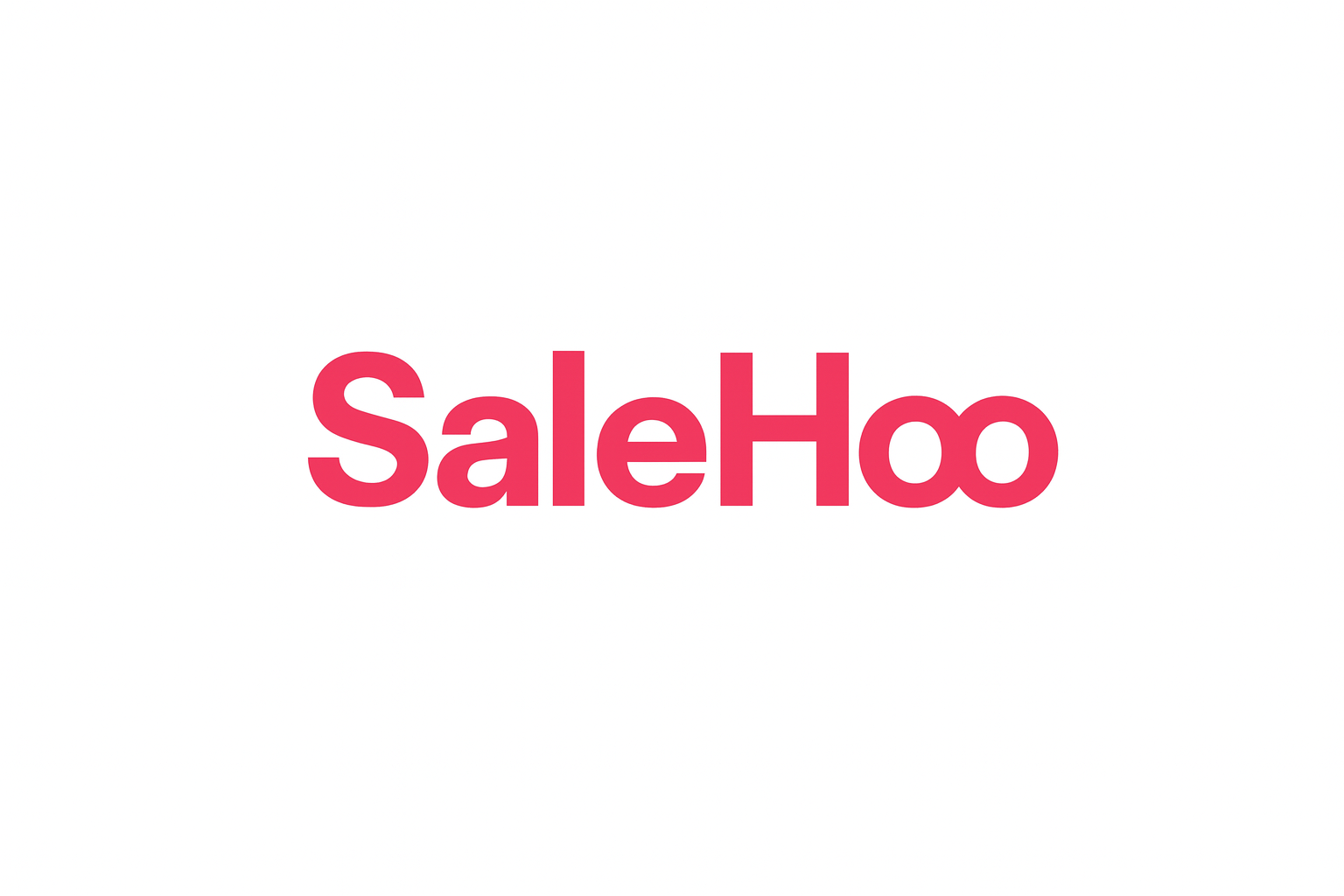
I value the time and effort you put into making this knowledge accessible.
I value the time and effort you put into making this data accessible.